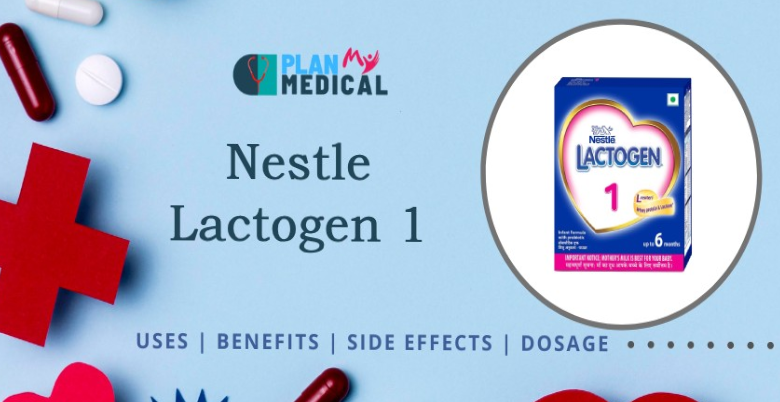Nestle Lactogen Stage 1 Parents naturally want the best for their infants when it comes to food. Although breast milk is optimal for infants, there are times when it is either unavailable or insufficient. Lactogen 1 and other newborn formulae are lifesavers in these circumstances. This in-depth analysis covers all the bases, from the composition and advantages of Lactogen 1 to safe and effective administration.

Nestlé, a world-renowned food and beverage company, makes a superior newborn formula called Lactogen 1. It is formulated to meet the nutritional needs of newborns and babies up to the age of six months. When moms are unable or unwilling to breastfeed, physicians commonly suggest lactogen 1 as an acceptable replacement to breast milk.
Uses Nestle Lactogen Stage 1

Lactogen 1 is an excellent substitute for breast milk, however it must be used with caution. Instructions for using Lactogen 1 safely and effectively are as follows:
Consider reading about –
- Always check with your baby’s paediatrician before giving your infant Lactogen 1. They can provide your child individualised advice and guarantee that he or she is making the best decision.
- Always use the product in accordance with the directions provided on the container. This will guarantee that your baby’s formula has been properly blended.
- Tidiness Is Crucial prepare Lactogen 1 in a sanitary manner by carefully washing and sterilising all equipment, containers, and hands.
- Lactogen 1 should be kept in a cold, dry area with the lid well closed to retain freshness. If the formula’s expiration date has passed, don’t use it.
- Lactogen 1 should only be given to newborns between the ages of 4 and 6 months. Following this time, you should switch your infant on to a follow-on formula.
- Lactogen 1 should not be diluted with extra water or mixed with other meals or drinks since doing so might alter the formula’s nutritional profile.
- Baby’s feeding schedule should be adjusted as necessary. Feeding intervals for newborns range from every 2 to 3 hours. Listen to your child’s indications for whether he or she is full or hungry.
- Breastfeeding moms who choose to supplement with Lactogen 1 should stick to a regular feeding schedule that allows for both breast milk and formula.
When your child is ready to start solid meals, talk to your physician about how to make the transition.
Benefits and Side-effects of Nestle Lactogen Stage 1

Lactogen 1 is designed to be gentle on a baby’s sensitive stomach and immune system by avoiding common allergens. It has a lower potential for allergy development compared to other formulas made using cow’s milk.
visit on link : Surfaz SN Cream
- Development it’s natural for parents to worry about whether or not their kid is developing normally while on formula. Your baby’s growth and development may be tracked through regular visits to the paediatrician.
- Babies that cry more on formula may have colic, but this is not always a clue that there is something wrong with the formula. There are several potential causes of colic in infants; seeking advice from a doctor is recommended.
- Some infants who use formula may develop constipation. Your paediatrician may suggest changing the formula or providing alternative treatments if this problem persists.
- Babies who are given formula may appear hungrier or less content than their breastfed counterparts. You shouldn’t worry that your kid isn’t receiving enough to eat because of this. If you are worried, you should see a paediatrician.
- If your child has to switch formulas, you should consult with your physician to make the change as easy on their digestive system as possible.
Composition of Nestle Lactogen Stage 1

- Lactogen 1 contains all the vital nutrients for your baby’s development and growth, including protein, carbs, lipids, vitamins, and minerals.
Read more : Abhayarishta Syrup
- Lactogen 1 is formulated to be readily digested by newborns, which can help alleviate gastrointestinal problems like gas, bloating, and constipation.
- Immune System Support lactogen 1’s nucleotides and prebiotics help support your baby’s immune system and promote a healthy gut microbiome, both of which are crucial to your child’s well-being.
- Your baby’s brain and eyesight will benefit from Lactogen 1 since it contains LC-PUFAs, including DHA and ARA, which are essential during the first few months of life.
- Lactogen 1 is suitable for busy parents or when nursing is not an option because it is easily accessible and requires minimal preparation.
Substitute to Nestle Lactogen Stage 1
When mothers are unable to breastfeed, a reliable alternative is Lactogen 1, a baby formula. Its composition, which is meant to be as similar to breast milk as possible, offers a healthy diet that promotes development.

But, for the sake of your baby’s health, it’s crucial that you use it wisely and discuss it with your physician. Keep in mind that your child’s physician is the best source of information on matters of health and nutrition.
Fact Box : Nestle Lactogen Stage 1
Lactogen 1 is carefully formulated to be an exact chemical match for breast milk. Its main components are:
Read also about : Mometasone Furoate Cream
- Whey protein is an excellent type of protein that is easy on a baby’s digestive tract and supplies him with the amino acids he needs to thrive.
- Sugar present naturally in breast milk, known as lactose, is the main source of energy in Lactogen 1. It’s a convenient way to give your infant a boost of energy.
- Milk Fat the fat in Lactogen 1 has been chosen and altered to mimic the fat profile of human breast milk as closely as possible. It’s a vital source of energy for your baby’s physical and mental growth.
- Calcium and iron are only two of the many vital elements included to Lactogen 1 to ensure your baby’s healthy development. Vitamins A, D, and E, as well as other vitamins and minerals, are also included.
- Nucleotides are the structural components of nucleic acids like DNA and RNA. They are added in Lactogen 1 to aid with your infant’s general growth and immune system development.
- Like breast milk, the prebiotic fibres in Lactogen 1 help maintain a balanced microbiome in the digestive tract. This aids in keeping the digestive system in check.
- Fatty Acids lactogen 1 contains the important fatty acids for brain and eye development, long-chain polyunsaturated fatty acids (LC-PUFAs) such as docosahexaenoic acid (DHA) and arachidonic acid (ARA).